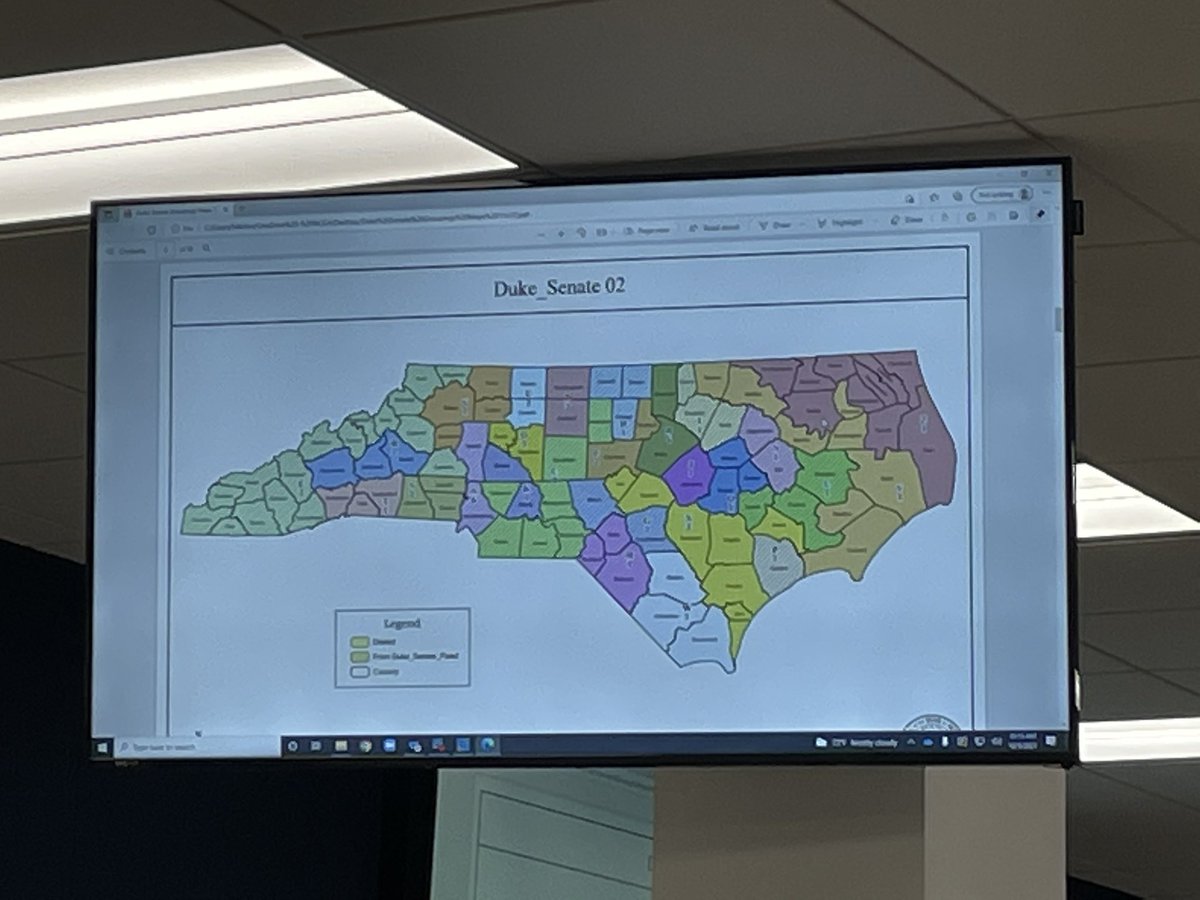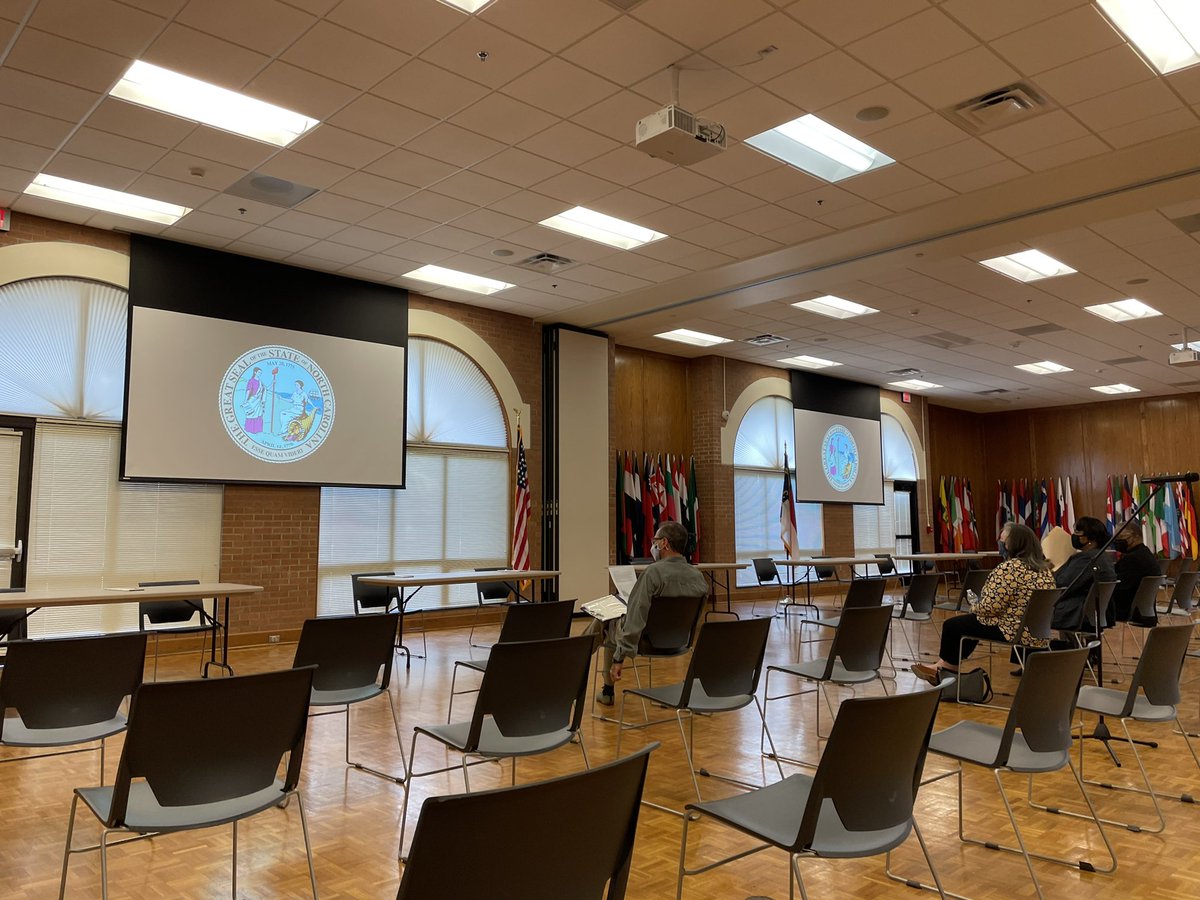
Looks like the #NCGA House Redistricting Committee meeting is about to get started, finally. 

Rep. Hall says they are waiting on a number of amendments - another 10 minutes. Seems like there must have been a lot of intra-party negotiation in the past 3.5 hours.
Well, it's been 10 minutes... and it's nearly 6pm
20 minutes...
It's been 45 minutes since Rep. Hall said 10 minutes. I'm starting to think this meeting might not happen!
Ok, Hall is finally back and is going to present on the Republican proposed House map - with a lot of amendments, apparently.
Huh. Apparently Pittman isn't planning to run next year, this is the reason Hall says he is changing Cabarrus.
Hall is making some kind of change to the Chatham district in response to the volume of feedback. Not sure what kind of change there is though.
Sampson / Bladen / Wayne is changed to a Bladen/Pender grouping!
That's actually Bladen and Sampson not Pender. Hall misspoke.
Harrison asks if and why VTDs in Durham are split. Hall says its because of population.
Harrison asks about VRA districts - Hall trots out the same old racial data thing.
Amendment is adopted.
Hall says that rural areas have lost a lot of population. Cites changes he made to reflect that.
Hall says he tried to keep current districts intact as much as possible - (grandfathering in gerrymandering) - and asks members to vote against any map that isn't as close as possible to previous maps.
An amendment for Mecklenburg is presented by Rep. Reives. Reives asks for a roll call vote on all of his amendments.
Reives' says that Hall's map splits a VTD in one district. Proposes changes that increase compactness and reduces municipal splits.
Rep. Carney asks why Hall is splitting a certain VTD in his map. Hall says it was to keep Huntersville whole.
Carney asks why there's a split VTD in 90 - which district has the worst compactness in the whole map. Hall says he needs to get a more detailed map to answer that.
Rep. Harrison is putting forward an amendment to the Randolph / Chatham grouping. Her amendment would move the Providence VTD back into Randolph County, balancing the population deviation there.
Rep. Hall says that he will support this amendment.
This amendment passes.
Hall complains that these amendments were not offered until last night. Also that he made as few changes as possible to Alamance because a court accepted the previous version.
Hall says that he (for some reason) isn't able to talk about precinct level decisions IN HIS OWN MAP - because the amendments were offered late.
BTW, no one saw his amendment either before this meeting, it seems.
The Alamance amendment doesn't pass.
BTW, there are 7 Dems and 14 Republicans at this committee meeting... very proportional.
Reives offers an amendment on Cumberland that doesn't split Hope Mills and has a better compactness score than Hall's map.
Rep. Cooper-Suggs asks Hall why his map splits Hope Mills. Hall says 95% of the city is not split in his map (not sure what that means exactly)
Hall says the same thing about preserving the previous districts. Cooper-Suggs asks whether Hall is going to do anything not to crack Black voters. Hall just says he believes the district will be upheld in court.
The committee has adjourned to go to session but will be back to finish up this map I believe.
Looks like the committee is back. Waiting for Rep. Reives to come speak on his amendment concerning Stokes County. You can see how in Hall's map it has a tail going down into Winston-Salem. 

Reives is here - says that his amendment does not split any VTDs or double bunk incumbents. Better compactness than Hall's.
Hall again just says he tried to preserve districts. The previous map had Forsyth grouped with a completely different county - Yadkin. 

Rep. Harrison says Reives' amendment has a much better compactness score - Harrison says splitting Winston with that finger from Stokes is not a good fit for the city.
Hall doesn't answer the question really, just complains about these amendments being offered today.
Harrison says she thinks we should consider starting from scratch on districts since so much has changed in the maps.
Rep. Richardson says keeping Tobaccoville together is better, so he encourages members to vote for it.
Reives says that his map improves compactness. Hall says the same thing - just trying to preserve past districts.
Harrison says that compactness is important. Asks Hall why Summerfield is split into three districts. Complains that he wasn't able to prepare .... to talk about the decisions he made in drawing his own map.
Seriously, he's mad about amendments but if the questions he's getting are about his own map, which they are, shouldn't he be able to answer them after working on it for weeks?
Next amendment is on Pitt - Reives. This is Pitt in Hall's. Reives says his amendment doesn't split Winterville. Hall says Winterville is "mostly unsplit" (is that a thing?) 

Rep. Hawkins asks why Winterville is split in Hall's map. Hall is petulant - again complains about not seeing the amendment but not answering the question about the decisions he made in his own map.
Hall says that this was "sprung on him" - Again, he labored over this map for weeks, and he can't say why he made the decisions he made.
Hawkins asks if Hall is concerned about Hall's map packing voters in Pitt. Hall says he hasn't looked at race so he can't answer this question.
Hawkins suggest that if the chairman feels there's not enough time to do this in a considered way, Hall could help push back the primary.
Hawkins asks for the reasoning behind the VTD splits in his map. Hall says he drew this map in the committee room, that it complies better with the criteria than the amendment, although admits he has no clear evidence of this.
Hawkins ask about Hall's map's treatment of the precincts bordering Lenoir - wants to understand Hall's reasoning. Hawkins says he understands if Hall can't speak on the amendment, he's only asking about Hall's own map.
Hall says the amendment splits Pitt between North and South - but as far as I can tell, so does his map? : 

I feel like Hall might have made updates to his map because I can't see what Hawkins was talking about wrt Lenoir
Reives asks what is different about Pitt that means it gets extensive changes, not the minimal changes Hall says was important in other districts. Here they are compared as I have them. 



That amendment fails.
Amendment to Wake County - This is Wake in Hall's map. Hall says his map is better at keeping rural areas of Wake separate from bigger cities.
Amendment to Wake County - This is Wake in Hall's map. Hall says his map is better at keeping rural areas of Wake separate from bigger cities.
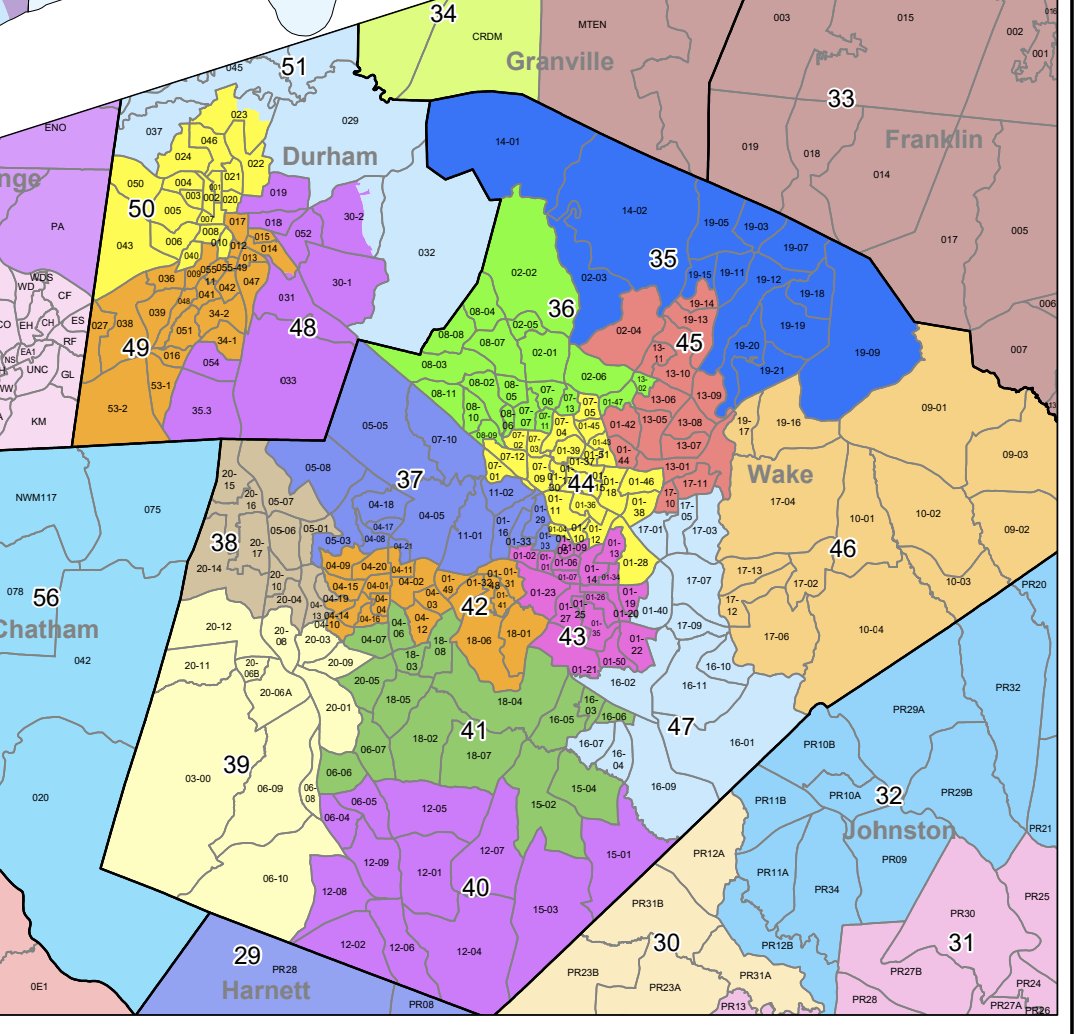
Hall again complains about the amendments being offered.
Hawkins asks Hall where he started drawing the Wake map - asks if he started with district 35 in SW Wake county, drawing that first.
Hall says he worked on this map for weeks and it's not fair to ask him to remember where he started.
Hall says it's typically easier to draw maps starting on the edges.
Hawkins says that the amendment does split fewer municipalities - asks why Morrisville is split.
Hawkins says that the amendment does split fewer municipalities - asks why Morrisville is split.
Hall says this is because of Reps. Adcock and Dahle.
Hawkins is referring to specific districts in Hall's map but since we haven't seen the bill's actual map the numbers don't line up with the HBK-11 that was released and I can't tell exactly what he's talking about.
Hawkins is referring to specific districts in Hall's map but since we haven't seen the bill's actual map the numbers don't line up with the HBK-11 that was released and I can't tell exactly what he's talking about.
Returning to the Mecklenburg amendment.
Hall says he started with the current map in Mecklenburg and notes that it was largely drawn by Democratic members.
Hall says he started with the current map in Mecklenburg and notes that it was largely drawn by Democratic members.
Also why does Mecklenburg look squashed in the enacted map they put out?
Amendment fails.
Next amendment is on Buncombe.
Hall says his map keeps Asheville in as few districts as possible.
Next amendment is on Buncombe.
Hall says his map keeps Asheville in as few districts as possible.
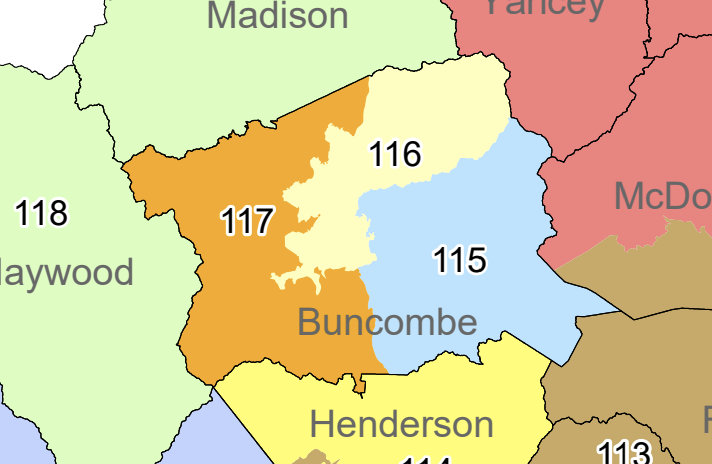
Rep. Carney says that Reives amendment is much, much more compact than Hall's. Asks Hall for an explanation of the shape of districts 116 and 117.
Hall says that they look that way because he was keeping Asheville in 2 districts.
Carney says that Hall's map looks like previous gerrymandered map. this is the 2017 map.
Carney says that Hall's map looks like previous gerrymandered map. this is the 2017 map.
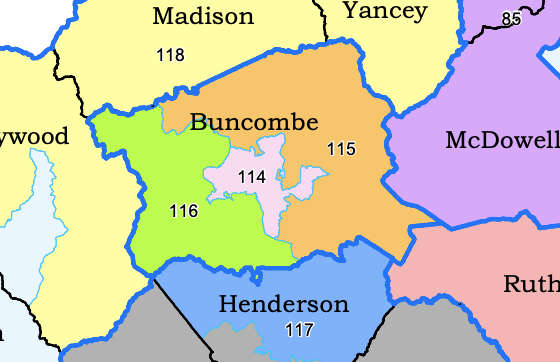
The amendment fails.
Harrison asks how Hall organized and considered the public comments to use them in his map drawing.
Hall says he was in the room, and comments were distributed so...
Hall says he was in the room, and comments were distributed so...
Harrison says she meant how Hall incorporated comments.
Harrison asks how Hall decided to draw when criteria were in conflict since there was no official prioritization. Hall just says he tried to comply with criteria as best he could.
Harrison asks how Hall decided to draw when criteria were in conflict since there was no official prioritization. Hall just says he tried to comply with criteria as best he could.
Harrison says that drawing maps that aren't going to pass muster in court is expensive and they should be mindful of that.
Hawkins asks about Durham, which has not been litigated as much as other areas. Asks Hall to interpret the map. 

Hall explains VTDs.
Hawkins asks why VTD 30-2 in Durham is - I assume - split? Hawkins says that individual census blocks were chosen to put into the district with Person.
Hawkins asks why VTD 30-2 in Durham is - I assume - split? Hawkins says that individual census blocks were chosen to put into the district with Person.
Asks Hall about his reasoning in that precinct. Hall says he doesn't have a map in front of him but that part of Durham has a lot of VTDs which makes it hard to keep population deviations correct.
Hawkins says the VTDs and census blocks are named in the bill. Hawkins asks what Hall thinks the people in the southwest part of Durham have in common with Person county.
Hall says the problem is just the grouping of Durham and Person County.
Harrison says she reviewed Stephenson before this meeting and says that it mandates the VRA districts are drawn before the rest of the map. Asks how Hall complied with the VRA.
Hall says that Covington said that there is no racially polarized voting in North Carolina AND I JUST MIGHT TEAR MY HAIR OUT IF I HEAR THAT ONE MORE TIME
Harrison cites Covington and says that the decision does acknowledge the existence of reports that were before the legislature showing racially polarized voting in the state.
Rep. Richardson asks whether they have adequately paid attention to what the public was asking for - it's impossible to do it fairly otherwise.
Richardson says we need an impartial commission - the legislature cannot be a good, effective body without competitive districts. We should let the people draw these lines.
Rep. Carney says that since 2003 there have been 39 independent redistricting commission bills filed - the public wants this and we still haven't done it.
Hawkins says democracy depends on what we do here. We need to keep communities whole so that voters can vote on common interests. If not that hurts people's perception of our work.
Hawkins says that people judge these maps on the eye test - when the map doesn't make sense to them on sight that's a problem for them.
Torbett moves for the vote. Hall's map passes along party lines.
The committee adjourns and we all get to come back in 12 hours for the next round, yay
• • •
Missing some Tweet in this thread? You can try to
force a refresh










